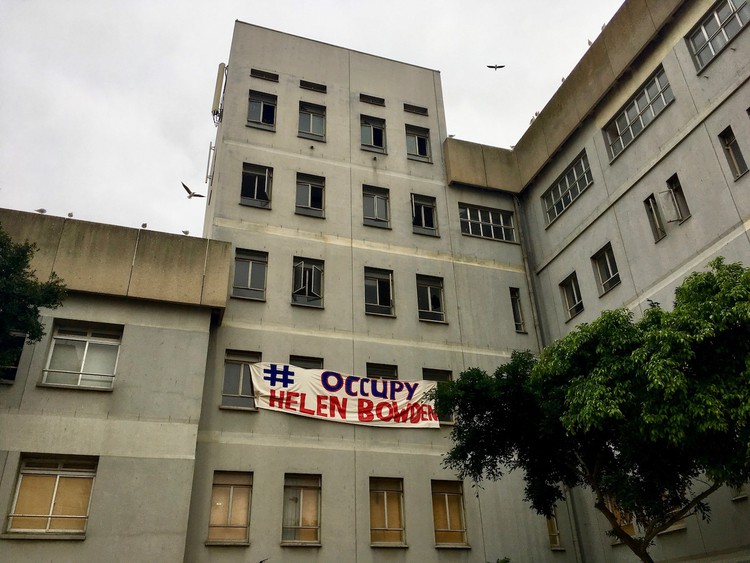
Helen Bowden Nurses Home opposite Cape Town’s Waterfront has been illegally occupied since March 2017. Photo: Ashleigh Furlong
29 August 2018
In March 2017, a group of housing activists occupied two abandoned state-owned buildings in Cape Town: Woodstock Hospital and Helen Bowden Nurses Home. The latter, opposite the Waterfront, is located on prime land; it is potentially one of the most expensive properties on the continent.
Reclaim the City, the group that led the occupation, did not expect their act of civil disobedience to last long. They thought the provincial government would move to evict the occupiers within a few days. The intention was to use the occupation to highlight what housing activists call the “apartheid spatial planning” of Cape Town, which in a nutshell means that working-class people live far from work in the city centre and upmarket suburbs like Sea Point, or are facing evictions from areas close to the city because of soaring housing prices and rents.
But the province has not yet made any attempt to evict the occupiers. Nearly a year-and-a-half later there are now several hundred people living at Helen Bowden — dubbed Ahmed Kathrada House by the new residents — and well over a hundred people living at Woodstock Hospital — which they call Cissie Gool House. More people are likely to move in over the next few months.
These buildings are no longer merely the site of political protest; they are now the homes of families that have been evicted, or homeless people who slept rough, or workers who wanted to live closer to work so that they can make ends meet because of the reduced transport costs and rent-free accommodation. Reclaim the City, together with Ndifuna Ukwazi, the NGO that has supported it from the beginning, has had the difficult task of managing these two buildings.
Whether or not you approve of Reclaim the City’s occupation, it was an audacious move. The debate about property rights is the foremost political one in the country at the moment, especially with the ANC’s decisions to amend the Constitution to allow expropriation without compensation. This debate’s resonance stems from the fact that millions of poor South Africans, especially in urban areas, want a piece of property to call home. Reclaim the City’s occupations bring this demand into sharp focus.
GroundUp has covered the occupations since they began. We hope this series of articles will help readers to understand why they happened, what life is like for some of the occupiers, the political battles inside the occupations, and the larger struggle for housing that triggered them.